
Excertos do catálogo
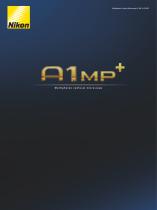
Multiphoton Confocal Microscope A1 MP+/A1R MP+ NIKON CORPORATION Fuji Bldg., 2-3, Marunouchi 3-chome, Chiyoda-ku, Tokyo 100-8331, Japan www.nikon.com/ Multiphoton confocal microscope
Abrir o catálogo na página 1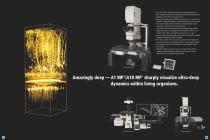
The A1 MP+/A1R MP+ multiphoton confocal microscopes provide faster and sharper imaging from deeper within living organisms, extending the boundaries of traditional research techniques in biological sciences. •Ultrahigh-speed imaging up to 420 frames per second (fps) (512 x 32 pixels) with multiphoton imaging using A1R MP+’ high efficiency optics and resonant scanner. • Deep specimen imaging with high-sensitive non-descanned detectors (NDD) located close to the back aperture of the objective lens. A new model of an ultrasensitive gallium arsenide phosphide (GaAsP) NDD for upright microscopes...
Abrir o catálogo na página 2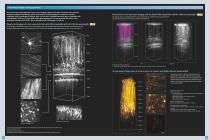
Ultra-deep imaging of living specimens The ultrasensitive GaAsP NDD allows clear in vivo imaging in deeper areas than ever before and is powerful enough to analyze the mechanisms, such as brain neurons, of living specimens. In addition to a model compatible with a wavelength of 1080 nm, there is a new one for upright microscopes that is compatible with a wavelength of 1300 nm. This new NDD enables deep imaging up to 1.4 mm in combination with a newly developed scanning head A1R MP+ that is compatible with a wavelength of 1300 nm. Mouse brain in vivo dual color imaging with the GaAsP NDD...
Abrir o catálogo na página 3
Channel unmixing Fast multiphoton imaging, powerful enough for in vivo imaging Channel unmixing The Nikon resonant scanner is capable of high-speed 420-fps imaging, the world’s fastest for a multiphoton microscope using point scanning technology. Unique to this design is a resonant scan mirror capable of imaging full fields of view at much higher speeds than traditional galvano scanners. Nikon's optical pixel clock system, which monitors the position of the resonant mirror in real time, adjusts the pixel clock to ensure more stable, geometrically correct and more evenly illuminated imaging...
Abrir o catálogo na página 4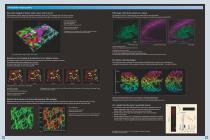
Channel unmixing Multiphoton imaging gallery Four-color imaging of human colon cancer cells in in vivo SHG image of the brain surface of a mouse Three-dimensional volume rendering of implanted subcutaneous tumor of HCT116 expressing Fucci. The cell cycle of tumor cells and the environment (collagen fiber and vessels) are visualized. Upper right, only collagen fiber and vessels are shown. The neocortex of an H-line 5-week-old mouse was studied with the open skull method. The SHG signals from dura mater and EYFP fluorescence signals were simultaneously acquired using the NDD. Red: Fucci...
Abrir o catálogo na página 5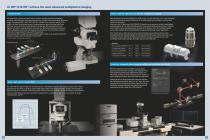
A1 MP+/A1R MP+ achieve the most advanced multiphoton imaging Standard NDD Nikon’s high-NA objectives are ideal for multiphoton imaging The fluorescence emissions from deep within a specimen are highly scattered in multiphoton excitation, and therefore the conventional detector using a pinhole cannot provide bright fluorescent images. The episcopic NDD in the A1 MP+/A1R MP+ is located close to the back aperture of the objective to detect the maximum amount of scattered emission signals from deep within living specimens. The use of this four-channel detector in combination with special...
Abrir o catálogo na página 6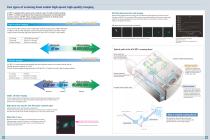
Two types of scanning head enable high-speed, high-quality imaging A1 MP+ is equipped with a galvano (non-resonant) scanner for high-resolution imaging. A1R MP+ is a hybrid scanning head that incorporates both galvano and ultrahigh-speed resonant scanners. A1R MP+ allows imaging and photoactivation at ultrafast speeds necessary for revealing cell dynamics and interaction. Ultrafast photoactivation and imaging High-resolution imaging Photoactivation during fluorescence imaging can be conducted using both galvano and resonant scanners. Two types of A1R MP+, the conventional 1080 nm type and...
Abrir o catálogo na página 7
Key Nikon innovations for improving image quality Enhanced spectral detector The best image quality is achieved by an increased light sensitivity resulting from comprehensive technological innovations in electronics, optics and software. Nikon’s original spectral performance is even further enhanced in the A1 MP+ series, allowing high-speed spectral acquisition with a single scan. In addition, advanced functions, including real-time unmixing, are incorporated. Low-angle incidence dichroic mirror With the A1 MP+ series, the industry’s first low-angle incidence method is utilized on the...
Abrir o catálogo na página 8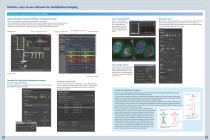
Intuitive, easy-to-use software for multiphoton imaging NIS-Elements C Acquisition and Analysis software Simple operations common with Nikon confocal microscopes Channel unmixing function Microscope control •All necessary operations for image capture are displayed in one window. •Lasers and detectors for visible laser excitation can be switched simply by selecting fluorescent probe to be used. •One-touch switching of high speed resonant scanner and high-resolution galvano (non-resonant) scanner •Simultaneous photoactivation with high speed imaging is possible with visible laser excitation....
Abrir o catálogo na página 9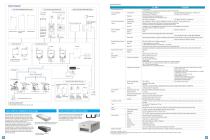
System diagram ^ Laser Unit for Multiphoton Microscopy ^ Chameleon Vision II MaiTaiHP/eHP InSight DeepSee*1 Laser Unit for Confocal Microscopy ^ LU-LR 4-laser Power Source Rack ^ Detector Unit for Confocal Microscopy^ A1-DUS Spectral Detector Unit Filter Cubes ^ Incident Optical Unit ^ ^ Scan Head and Controller ^ Scan Head Detector Unit for Multiphoton Microscopy Diascopic Non-descanned Episcopic Non-descanned Detector (Standard/ (Standard/ Filter Cubes *1 When using a scan head for 1300 nm *2 When using Spectral Detector Unit. *3 Dedicated adapter is required depending on microscope...
Abrir o catálogo na página 10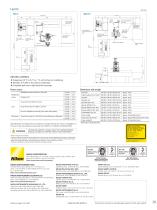
Laser Chiller for Multiphoton Microscopy Incident Optical Unit Incident Optical Unit Laser for Multiphoton Microscopy Laser Controller for Multiphoton Microscopy Laser Controller for Multiphoton Microscopy Scan Head Scan Head Non-Descanned Detector Vibration Isolated Table Non-Descanned Detector 4 Detector Unit, Spectral Detector Unit, Controller Vibration Isolated Table 4 Detector Unit, Spectral Detector Unit, Controller Laser Chiller for Multiphoton Microscopy 4-laser Module A, 4-laser Power Source Rack Approx. 2750 4-laser Module A, 4-laser Power Source Rack Laser for Multiphoton...
Abrir o catálogo na página 11Todos os catálogos e folhetos técnicos Nikon Instruments
-
Super Resolution Microscopes
28 Páginas
-
Microscope Objectives for Bioscience
16 Páginas
-
HCA
8 Páginas
-
DS-Fi3
16 Páginas
-
ShuttlePix
8 Páginas
-
A1 MP+ / A1R MP
15 Páginas
-
A1 HD25 / A1R HD25
15 Páginas
-
TI-E
32 Páginas
-
ECLIPSE TS2
8 Páginas
-
ECLIPSE TS2R
8 Páginas
-
N-SIME
6 Páginas
-
N-SIM N-STORM
24 Páginas
-
ECLIPSE E100 LED
8 Páginas
-
Bio Station IMQ
8 Páginas
-
ECLIPSE Ti2
24 Páginas
-
A1 MP+ / A1R MP+
20 Páginas
-
DIGITAL SIGHT SERIES
16 Páginas
-
Eclipse LV100N-POL Ci-POL
8 Páginas
-
ShuttlePix Brochure
5 Páginas
-
NeoScope Brochure
16 Páginas
-
Eclipse FN1
12 Páginas
-
Eclipse Ti
32 Páginas
-
C2 Plus
16 Páginas
-
A1+ / A1R+
13 Páginas
-
Biological Microscopes
24 Páginas
-
Stereomicroscopes
32 Páginas
-
SMZ18
16 Páginas
-
N-SIM E
4 Páginas
-
N-STORM 4.1
13 Páginas
-
A1_MP
11 Páginas
-
AZ_C1
2 Páginas
-
MiBrochure
2 Páginas
-
A1+_A1R+_2CE-SBTH-9
13 Páginas
-
C2+_2CE-SCHH-5
16 Páginas
-
High Content Microscopy
2 Páginas
-
NIS-Elements
8 Páginas
-
Digital Sight Series
9 Páginas
-
ShuttlePix P-400R
5 Páginas
-
AZ100M
8 Páginas
-
AZ100
4 Páginas
-
Eclipse E200POL
3 Páginas
-
Eclipse LV100ND POL/DS
2 Páginas
-
Eclipse E100 LED
4 Páginas
-
Eclipse Ci-E/ Ci-L
5 Páginas
-
Eclipse Ni
15 Páginas
-
Eclipse E200 POL
3 Páginas
-
Biological Microscopes
12 Páginas
-
ECLIPSE LV100N POL 50i/ POL
4 Páginas
Catálogos arquivados
-
Digital Sight Series Brochure
16 Páginas
-
Eclipse E100-LED
8 Páginas


































































